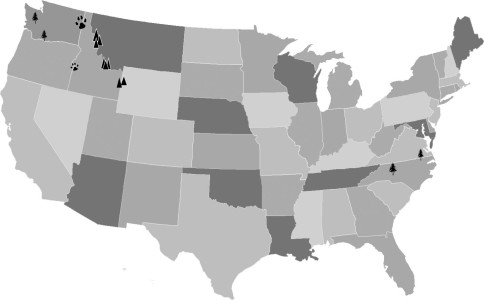What does America look like? That might seem like a strange question to ask of a country that prides itself on its commitment to diversity. Yet, with one sleepy sentence, “American Bear: An Adventure in the Kindness of Strangers” was born with the goal of answering that very question. The film was shown in JRC 101 on Thursday, Nov. 20 with an introduction and Q&A session after the showing by the film’s subjects and directors: Greg Grano and Sarah Sellman.
The couple documented its experiences traveling to a new place every night and depending on the kindness of strangers to host them.
“We need to go to Bear, Colorado,” mumbled Greg Grano in his sleep. Next to him rested his girlfriend Sarah Sellman, who heard the phrase and was disappointed to find out that there was no Bear, Colorado. Unfazed, however, the couple went on to discover five towns across America named Bear.
The documentary follows the couple’s trip through 30 states in 60 days. Its journey started in upstate New York and headed towards Bear, Washington. From there they travelled to the other four towns named Bear in Idaho, Arizona, Arkansas and Delaware.
Sellman and Grano first met at New York University’s Tisch School of the Arts, which they graduated from in 2011 with degrees in Film and Television. Sellman has been nominated for several prestigious awards for her short film “Hold Your Arms Out”, while Grano has been working at Syracuse University teaching leadership skills to students.
At first, they had few problems finding places to stay. They found ease in achieving their larger goal of discovering the wide breadth of people that lived in a country as vast as America. By the time Sellman and Grano had reached Chicago, however, it seems as though their luck had run out; they spent hours searching, but no one was willing to offer a place to stay.
“Big cities were more challenging in terms of the mission of the project,” Grano said. They experienced similar circumstances in Las Vegas and Atlanta.
The couple’s experience in Chicago made them question the motivations of people who refused to allow them to stay in their houses. The film featured a montage of various excuses from several locations was played, and Sellman and Grano discussed why Americans seemed to have an innate distrust of strangers.
“There aren’t really excuses,” said Sellman. “Just fears.”
Chicago also brought up another issue: race. Sellman and Grano are young, white, abled-bodied individuals. One African-American interviewee expressed concern over inviting them back to her house due to their race. In the post-viewing Q&A session, the couple admitted that their race was likely a factor.
“Many of the neighborhoods we stayed in were very homogenous, and we fit in,” Sellman said.
Conversations with their hosts tended to revolve around the hosts’ families and personal histories, sharing both positive and negative stories. Sellman and Grano felt this common thread throughout the entire nation really spoke to the country’s devotion to familial life. Almost all of those who the couple stayed with expressed admiration for their seemingly daunting task. Sellman and Grano reported positive experiences with all of those whom they stayed with. At the end of the trip, Sellman concluded, “Everyone is friendly, they just don’t think the rest of the world is friendly.”
For those interested in viewing the film, Sellman and Grano are doing an additional screening tonight at 7:30 pm in JRC 101. This screening will feature a new web series in which Sellman and Grano talk to several professors about the sociopolitical and cultural differences that may have played a role in the successes or failures of their mission.



















































